

Read, Write, Participate – Medium. Web Literacy - Mozilla Learning. Digitale Inklusion – Statusbericht zur Internetgesundheit. Digitale Bildung – Statusbericht zur Internetgesundheit. Elc digital literacy. Intercultural Competence Toolkit - Resources - Global Initiatives. Wondering how to engage students of vastly different economic, social, racial, and cultural backgrounds in the classroom?
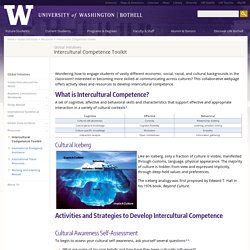
Interested in becoming more skilled at communicating across cultures? This collaborative webpage offers activity ideas and resources to develop intercultural competence. What is Intercultural Competence? A set of cognitive, affective and behavioral skills and characteristics that support effective and appropriate interaction in a variety of cultural contexts*. Cultural Iceberg Like an iceberg, only a fraction of culture is visible, manifested through customs, language, physical appearance.
The iceberg analogy was first proposed by Edward T. Activities and Strategies to Develop Intercultural Competence Cultural Awareness Self-Assessment To begin to assess your cultural self-awareness, ask yourself several questions**: Digital literacy higher education. Computing and digital literacy education needs a unified approach – EurActiv.com. SPECIAL REPORT / As EU Code Week comes to a close this weekend, the ECDL Foundation writes that education programmes promoting coding need to be balanced with basic technology skills, which are too often lacking—even among so-called ‘digital natives’.
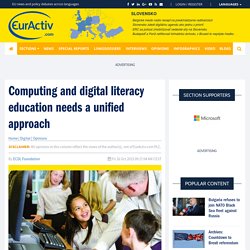
The ECDL Foundation is an international organisation promoting ICT skills. The question of how to develop coding skills at school has received a lot of attention recently. Initiatives have been started in various countries around Europe, including moves to integrate coding into the school curriculum. But there is a danger that this focus on coding risks diminishing the quality of other aspects of computing and digital literacy education.
Young people need to be able to develop strong digital literacy skills, and to have the opportunity to learn computing, including coding, yet computing education today is in danger of becoming fixated on coding. Digital Literacy 2.0. Howard Rheingold on 'Net Smart' for Change11 MOOC. You blog: howard rheingold. Just finished Howard's Net Smart how to use social media intelligently, humanely, and above all minduflly.. today's digital literacies can make the diff between being empowered or manipulated, serene or frenetic.
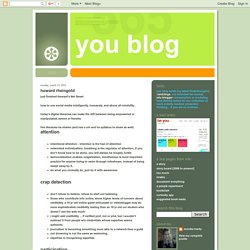
Developing digital literacies. Digital literacies are those capabilities which fit an individual for living, learning and working in a digital society.
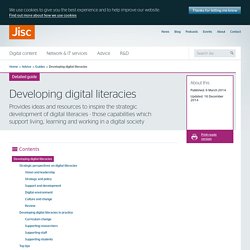
Digital literacy looks beyond functional IT skills to describe a richer set of digital behaviours, practices and identities. What it means to be digitally literate changes over time and across contexts, so digital literacies are essentially a set of academic and professional situated practices supported by diverse and changing technologies. This definition quoted above can be used as a starting point to explore what key digital literacies are in a particular context eg university, college, service, department, subject area or professional environment. Media Literacy Lab. Digital & Media Literacy Education - A Teacher’s Guide. Vsav_toolkit_en.pdf. MIL Curriculum for Teachers. Teachers are the gateway to literate societies.
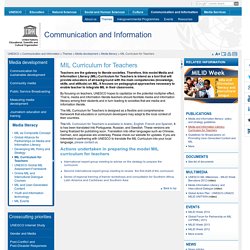
Therefore, this model Media and Information Literacy (MIL) Curriculum for Teachers is intend as a tool that will provide educators of all background with the main competencies (knowledge, skills, and attitude) on MIL. It focuses on pedagogical approaches necessary to enable teacher to integrate MIL in their classrooms. By focusing on teachers, UNESCO hopes to capitalize on the potential multiplier effect. Media and information literacy curriculum for teachers; 2012 - 192971e.pdf. Paris Declaration on Media and Information Literacy adopted. Participants of the forum were invited to offer further comments by 21 July.
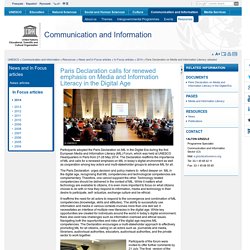
The final version of the Declaration is available here. The MIL Forum was a product of international collaboration between UNESCO, the European Commission (EC), the Autonomous University of Barcelona and other partners, within the framework of the Global Alliance for Partnerships on Media and Information Literacy (GAPMIL). MIL as Composite Concept. Empowerment of people through Media and Information Literacy (MIL) is an important prerequisite for fostering equitable access to information and knowledge and promoting free, independent and pluralistic media and information systems.
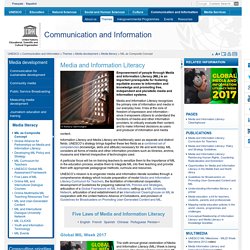
Media and Information Literacy recognizes the primary role of information and media in our everyday lives. Infographic. As we venture into the 21st century, we as a society, are faced with more innovation and challenge than ever before.
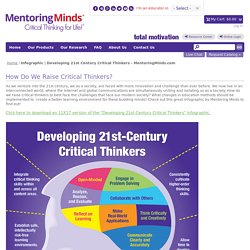
We now live in an interconnected world, where the Internet and global communications are simultaneously uniting and isolating us as a society. How do we raise critical thinkers to best face the challenges that face our modern society? What changes in education methods should be implemented to create a better learning environment for these budding minds? Check out this great infographic by Mentoring Minds to find out! Click here to download an 11X17 version of the "Developing 21st-Century Critical Thinkers" infographic.
Teaching Adolescents How to Evaluate the Quality of Online Information. An essential part of online research is the ability to critically evaluate information. This includes the ability to assess its level of accuracy, reliability, and bias. In 2012, my colleagues and I assessed 770 seventh graders in two states to study these areas, and the results definitely got our attention. Unfortunately, over 70 percent of the students’ responses suggested that: Poster%20and%20evidence%20sheet. Study Proves Why We Need Digital Literacy Education. A few months ago, the Internet buzzed with the results of a study comparing students' note-taking on computers versus note-taking with paper and pen.
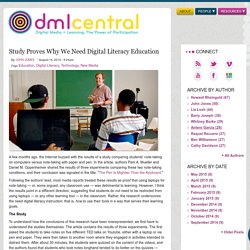
In the article, authors Pam A. Mueller and Daniel M. Oppenheimer shared the results of three experiments comparing these two note-taking conditions, and their conclusion was signaled in the title: "The Pen Is Mightier Than the Keyboard. " Following the authors' lead, most media reports treated these results as proof that using laptops for note-taking — or, some argued, any classroom use — was detrimental to learning. However, I think the results point in a different direction, suggesting that students do not need to be restricted from using laptops — or any other learning tool — in the classroom. The Study To understand how the conclusions of this research have been misrepresented, we first have to understand the studies themselves. Curation as Digital Literacy Practice.
I have been writing my PhD so haven’t updated this blog for a while.
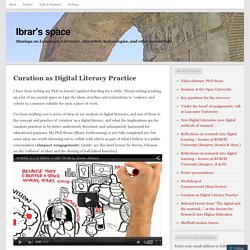
Thesis writing is taking up a lot of my mental space as I get the ideas, storyline and contentions to ‘coalesce’ and cohere in a manner suitable for such a piece of work. I’ve been mulling over a series of ideas in my analysis of digital literacies, and one of them is the concept and practice of ‘curation’ as a digital literacy, and what the implications are for curation practices to be better understood, theorised, and subsequently harnessed for educational purposes. My PhD thesis (Bhatt, forthcoming) is not fully completed yet, but some ideas are worth throwing out to collide with others as part of what I believe is a public conversation (#impact #engagement).
A Comprehensive Checklist of The 21st Century Learning and Work Skills. July 16, 2014 While searching for some resources on a paper and writing on the 21st century learning skills I came across this skills checklist created by the university of UToledo. This checklist is meant to help students build powerful resumes outlining all the skills they master.
I spent some time going through the components of this sheet and found it really sharing with you here. You can use this sheet with your students as an explanatory guide of some of the important skills ( I said some because some other important skills particularly those related to digital citizenship and digital literacy are missing) they need to work. Below is a round-up of the 9 most important skills which I selected from the entire list. You can access this list from this link. Web Literacy Map - 1.1.0. The Definition Of Digital Literacy. EU Improving the quality of teaching and learning in Europe’s higher education institutions JUNE 2013. EU Innovating Teaching and Learning Practices: Key Elements for Developing Creative Classrooms in Europe. IS UNIT WEB SITE - IPTS - JRC - EC. Objectives: Main Outcomes: A mapping framework of ICT-enabled innovation for learning: To read more, please click here.
How Do We Teach Digital Literacy to Digital Natives? Is it possible for our students to be both digital natives and digitally unaware? Young people today are instant messengers, gamers, photo sharers and supreme multitaskers. But while they use the technology tools available to them 24/7, they are struggling to sort fact from fiction, think critically, decipher cultural inferences, detect commercial intent and analyze social implications. All of which makes them extremely vulnerable to the overwhelming amount of information they have access to through the digital tools they use—and love! —so much. In fact, teachers surveyed in a recent Pew Study say they worry about “students’ overdependence on search engines; the difficulty many students have judging the quality of online information; and the general level of literacy of today’s students.” Use The News. Developing Digital Literacy Through Content Curation. Digital Literacy.
Edshelf: The Best Literacy Apps Collection by Andrew Earnshaw. Educatorstechnology: The 7 Important Literacies of The 21st Century Education. I have been studying literacy for more than a year in my Literacy Education MAEd program and have also written a 12 pages research paper on it but each time I sit down to write about it I discover a lot of new insights. Literacy is a deceptively broad topic that can be approached from various lenses. Schoolars from Plato to James Paul Gee have extensively written on the topic, each arguing for the validity of the theoretical lens through which they see it. Going through these theories I find myself inclining more to the progressivist camp or the " New Literacies" camp. Obviously,we are not in front of a single literacy but rather multiple literacies. Educatorstechnology: Two Awesome Presentations on Digital Literacy for Teachers. Educatorstechnology: Digital Literacy Simply Explained.
Edudemic: The 8 Skills Students Must Have For The Future. Editor’s note: This is a revised version of an article written by Katie Lepi that originally appeared on June 7th, 2014. We believe this information is still highly relevant, but we wanted to update it with the latest thinking. EU: Digital Literacies and eCompetence, ISSUE 38 (pdf) EU: Digital Literacies and eCompetence.
Mozilla Foundation: Mentoren für Web Literacies. Nichole Pinkard et al: new literacies. Teachthought: 3 Knowledge Domains For The 21st Century Student. Thinking in the 21st century is just different. That doesn’t mean we’re all suddenly omnipotent cyborgs, nor does it mean we’ve all become mindless social media addicts that spend our cognitive might tapping, swiping, and drooling on our smartphone and tablet screens. But just as the 19th century presented unique challenges to information processing than the 18th or 20th, the 21st century is different than the one before, or that the one that will come after. punyamishra.com recently released the following graphic that I thought was interesting, mainly in that it identified knowledge types for modern learning, settling on Foundational, Humanistic, and Meta Knowledge. 3 Knowledge Domains For The 21st Century Student 1.
Digital/ICT Literacy, Core Content Knowledge, Cross-disciplinary Knowledge 2. Life/Job Skills, Ethical/Emotional Awareness, Cultural Competence 3. Creativity and Innovation, Problem-Solving and Critical Thinking, Communication and Collaboration Using This Model In Your Classroom. Univ. of Strathclyde: Digital Literacies & Learning Design. Web Literacy Education for Educators - November Learning.